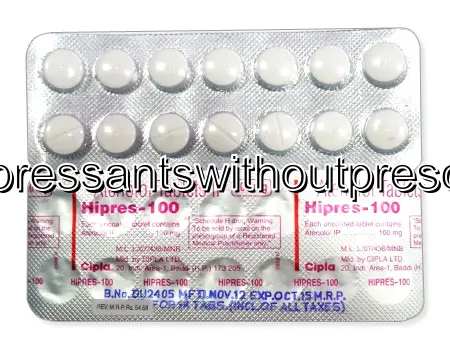| Package | Dosage | Price | Price per Dose | |
|---|---|---|---|---|
| Dosage: 25mg | ||||
| 350 pill | 25mg | £182.25 | £0.52 | |
| 140 pill | 25mg | £82.83 | £0.59 | |
| 84 pill | 25mg | £52.06 | £0.63 | |
| 56 pill | 25mg | £36.68 | £0.65 | |
| 28 pill | 25mg | £21.29 | £0.75 | |
| 14 pill | 25mg | £10.64 | £0.79 | |
| Dosage: 50mg | ||||
| 350 pill | 50mg | £215.39 | £0.62 | |
| 140 pill | 50mg | £91.12 | £0.65 | |
| 98 pill | 50mg | £68.63 | £0.71 | |
| 84 pill | 50mg | £65.08 | £0.77 | |
| 56 pill | 50mg | £41.41 | £0.75 | |
| 28 pill | 50mg | £24.84 | £0.89 | |
| 14 pill | 50mg | £13.01 | £0.95 | |
| Dosage: 100mg | ||||
| 350 pill | 100mg | £211.84 | £0.60 | |
| 140 pill | 100mg | £104.14 | £0.75 | |
| 84 pill | 100mg | £75.73 | £0.90 | |
| 56 pill | 100mg | £54.43 | £0.97 | |
| 28 pill | 100mg | £28.39 | £1.03 | |
| 14 pill | 100mg | £15.37 | £1.07 | |

Atenolol Description
Overview of Atenolol
Atenolol is a widely used medication primarily prescribed to treat cardiovascular conditions such as high blood pressure, angina, and certain types of arrhythmias. It belongs to a class of drugs known as beta-blockers, which work by affecting the heart and blood vessels. By blocking the effects of adrenaline, atenolol helps to slow down the heart rate and decrease the force of heart contractions. This leads to a reduction in blood pressure and alleviation of workload on the heart, making it effective for various heart-related disorders.
How Atenolol Works
The drug selectively targets beta-1 adrenergic receptors found mainly in the heart. This selective action means that atenolol is less likely to cause some of the common side effects associated with non-selective beta-blockers, such as bronchospasm. When taken regularly, atenolol helps to maintain a steady heart rate and blood pressure, reducing the risk of strokes, heart attacks, and other serious cardiovascular events. It is usually prescribed as a long-term medication and requires consistent intake for optimal effectiveness.
Effectiveness and Usage
Many users report that atenolol effectively manages their hypertension and angina symptoms. It is often prescribed alone or in combination with other medications. The typical dosage depends on the severity of the condition and the patient's response to treatment. Patients are advised to take the medication exactly as prescribed and to monitor their blood pressure regularly while on atenolol. It's important to follow medical guidance closely to optimize outcomes and minimize potential side effects.
Potential Side Effects
While atenolol is generally well tolerated, some users may experience side effects. Common issues include fatigue, dizziness, cold hands or feet, and gastrointestinal disturbances. More rarely, some individuals may experience sleep disturbances or depression. Because it affects heart function, atenolol should be used cautiously in patients with certain conditions such as asthma or severe peripheral arterial disease. It is vital to inform the healthcare provider about any pre-existing health issues before starting treatment.
Precautions and Interactions
Patients taking atenolol should be mindful of potential drug interactions. Combining it with other medications like calcium channel blockers or certain antidepressants can increase the risk of adverse effects. Additionally, abrupt discontinuation of atenolol can cause a sudden rise in blood pressure or worsen angina, so it should be tapered off gradually under medical supervision. Regular monitoring and communication with a healthcare professional are necessary to ensure safety and effectiveness.
Conclusion
Atenolol remains a valuable medication for managing various heart conditions due to its proven efficacy and targeted action. It helps control blood pressure, reduces angina episodes, and decreases the risk of serious cardiovascular events. However, like all medications, it requires careful use and monitoring. Patients should adhere to prescribed dosages, be aware of possible side effects, and consult healthcare providers regularly for optimal results and safety.
